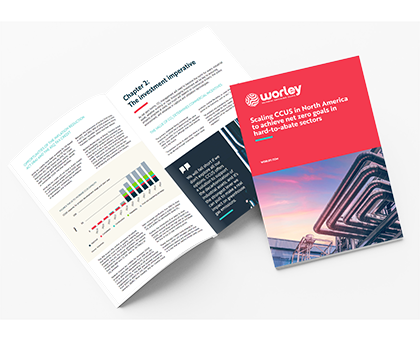CCUS: A pathway to decarbonize the North American
power industry
power industry
Carbon capture – a ready-today solution
Decarbonizing the power sector is crucial in the race to net zero. But as it stands, the sector still accounts for over 30 percent of the United States’ total CO2 emissions. How can power producers meet their emissions reduction targets while keeping up with increasing energy demand?
Decarbonizing the power sector will be challenging without some type of carbon capture, use, and storage (CCUS) in existing and new power infrastructures. According to the IEA, power plants could still emit 8 billion tonnes of CO2 in 2050 if power producers don’t act now.
Why is CCUS not progressing at scale in the power sector?
The historical lack of investment, high project costs and risks surrounding resiliency and power system flexibility have halted the progression of carbon capture at the scale required to align with the energy transition. However, this is changing quickly.
Regulatory measures are driving the recent rise in the adoption of CCUS technologies. While tax credits have been available for decades, the introduction of the Inflation Reduction Act and a subsequent boost to the 45Q Tax Credit incentive in the US have encouraged a new level of investor confidence in the CCUS market.
Governments around the world also want to stay competitive toward CCUS investments and development. They are concerned about the extent to which these US-based announcements will redirect investment from their jurisdictions and are beginning to respond in turn, accelerating the commercial viability of CCUS on the road to net zero.
Find out more about the regulatory opportunities for power producers to explore CCUS projects.
The primary challenge facing commercial incentives for CCUS lies in determining the value of CO2. Currently, it’s a market driven by regulation rather than revenue. However, with the creation of new business models to improve financial viability, a decline in costs, and a rise in regulation and policy incentives, new projects are driving a wave of momentum in the CCUS sector.
“We’re helping to develop standard designs that can be developed to different regional markets using in-house execution methods and digital tools as we work towards a ‘design one, build many’ approach to CCUS project delivery,” says Rob Berra, Group Senior Vice President CCUS.
Standardization presents a chance for the lowest-cost scenarios by driving down supply chain costs and simplifying design efforts. Currently, most approaches to projects are bespoke. To reach net zero in the time frame required, bespoke designs cannot be the only answer.
Keeping all technology options open will be vital in attracting the kind of urgent, large-scale investment that can bring new low -carbon technologies to market quickly. The main challenge is that most CCUS technologies are not yet proven at the scale required for net zero.
There are three primary technological pathways to capture CO2 from thermal power generation; pre-combustion, post-combustion and oxycombustion. We’re experienced across each of these pathways and work with leading commercial licensors to identify the best-suited technological processes for each application. We’ve supported multiple power producers across the US to model the technical – and subsequent financial considerations – of applying the various available technologies to their power units.
These emerging CCUS projects are driving existing commercially proven technologies forward. However, newer technologies could present even simpler and more scalable approaches to the same challenge. We’re helping to evaluate and develop first-of-a-kind solutions and eliminate uncertainties as power generators look to invest in advanced solutions to decarbonize.
Our diverse technology experience
We have diverse experience in a wide range of both mature and emerging carbon capture technologies.
We’re working on more than 40 active CCUS projects that involve 14 different carbon capture technologies. Including MHI, UOP, standard amines, Selexol, membranes, cryogenic, Shell Cansolv, Carbon Clean, BASF OASE, and Svante.
Statistic Cards
Absorption (post‑combustion)
We have expertise with open-art amines, proprietary solvents, and capture processes including Shell Cansolv, MHI KM-CDR, Econamine, Capturi, OASE Blue, ASCC, Carbon Clean, and more.
Absorption (pre‑combustion)
We’re working with mature and emerging technologies such as membranes, Selexol, and OASE White while expanding our knowledge of other technologies such as Propylene Carbonate.
Adsorption
We are evaluating solid-based CO2 capture technologies and have project experience with emerging technologies such as Svante and Cormetech.
Physical solvent
We’re working with Air Liquide’s technology Lurgi Rectisol™ on one of our active projects.
Oxy combustion
We’re experienced in natural gas and coal-fired power, and chemical sectors. From demo to large scale projects, we offer concept development, techno-economic evaluation, and engineering for up to 550 MWe plants.
Cryogenic
We have experience with mature technologies such as Air Liquide, Linde and UOP Honeywell. While expanding our working knowledge of technologies like Chart SES technology.
Other technology types
We’re working with and exploring various mature and emerging technologies. Including MTR and Compact Membrane Systems, calcium looping, biological with microalgae.
Scaling CCUS for your business
To meet mid-century net zero goals, the development and adoption of CCUS must accelerate at a pace and scale unlike ever before.
In this report, we explore the role of CCUS in meeting net zero targets. With expert insights and data analysis into the factors driving CCUS investments, the significance of standardization, and the challenges to overcome in delivering more cost effective and efficient large scale CCUS projects in North America.

Supporting our customers with CCUS
We’re working with VPI to retrofit cutting-edge carbon capture technology to its 1260 MW combined cycle natural gas power plant.
Our team designed and engineered the CCUS technology integration across two gas turbines and two auxiliary gas boilers. The scope also included the CO2 treatment, conditioning and compression for export into the region’s shared CO2 transport and storage system and the Immingham site’s existing flue gas, utility, and power tie-ins.
Supporting the Humber Zero initiative, this project could reduce the CO2 footprint of the facility by up to 3.3 million tonnes per annum upon completion.
We’re providing engineering and design services for a large-scale CCS project in Canada. The project aims to capture CO2 from a refinery and chemicals plant located at our customer’s project site. In June 2024, our customer announced the final investment decision (FID) on this project.
We’re supporting a global refiner with a pioneering CCUS project in the UK that could transform the global refining industry.
We’re leading the FEED phase to integrate carbon capture technology into the refinery. We’re also designing the infrastructure to export the CO2 into the proposed transport and storage network.
Our customer plans to capture at least 95 percent of the CO2 in the fluid catalytic cracking (FCC) flue gas. This CO2 will be compressed before it’s transported to be stored in a nearby geological formation.
Meet some of our CCUS experts
To date, we have supported over 390 CCUS projects across various industries. And we are currently providing engineering for over 30 advanced development projects across the CCUS value chain.
“Our current global CCUS portfolio of projects (Pre-FEED, FEED, or Execute) would capture a total of 110 Mtpa CO2. And our six global CCUS Communities of Excellence allow us to collaborate like never before to scale up CCUS project delivery,” says Gary LeMaire, Senior Director CCUS.
Get in touch


